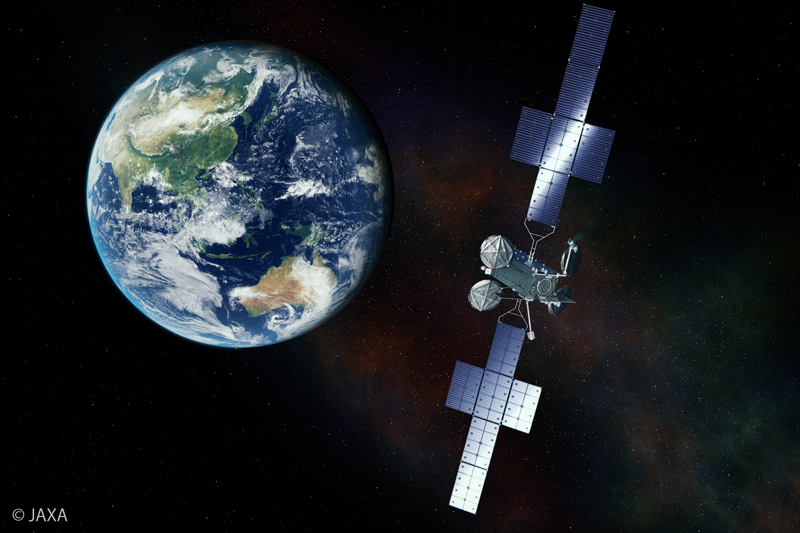 Instagram
Instagram
Access
Headquarters
(Koganei, Tokyo)
Kashima Space
Technology Center
(Kashima, Ibaraki)
ETS-9* Satellite Communications Project
ETS-9* Satellite Communications Project
In recent years, the demand for broadband communication is constantly increasing to provide
communication services in areas without terrestrial communication network, for example,
aircrafts, ships, remote islands, and disaster areas.
Furthermore, new types of communication, such as 5G and Internet of Things have emerged.
Satellite communications are drawing increasing attention as a viable alternative to meet the
new communication demands.
The emerging lack of available radio-frequency spectrum, which is essential for RF
communication, urges the need to realize large-capacity communication systems that utilize the
frequency resources more efficiently and do not depend entirely on the radio wave frequency.
For these reasons, we, NICT, promote an R&D project for aiming at the following goals:
- To increase communication capacity by utilizing Ka-band multi-beam and free-space optical communication.
- To enable flexible operation of the communication satellites by implementing a digital channelizer and a digital beamformer (DBF).
- To enhance the operational control efficiency of the satellite communication systems.
by collaborating with several universities and companies.
These technologies will be demonstrated by using the Engineering Test Satellite 9, which will be
launched after FY2025.
In this R&D project, we aim to realize competitive and cutting-edge communication
technologies.
∗Note: "ETS-9″ is a unique project name used by Space Communications Laboratory.
 ETS-9 Satellite Communications Project
ETS-9 Satellite Communications Project
Research and Development of Bandwidth-on-Demand High Throughput Satellite Communications System
<ETS-9* Satellite Communications Project>
In recent years, satellite communications system operators have been planning and deploying high-throughput satellite (HTS) systems. However, due to the long lifetime of the satellite (about fifteen years in Geostationary orbit), the demands in terms of capacity, service area, and application change during its lifetime. Thus, next-generation HTS will need to enhance flexibility to accommodate these changing demands. Flexible bandwidth per beam and/or flexible beam coverage will be the way to realize more efficient spectrum utilization.
In Japan, the R&D project entitled "Research and Development of Bandwidth-on-Demand High Throughput Satellite Communications System" has been started since 2016. The goal of the R&D is the realization of flexibility in the frequency bandwidth allocation for the HTS as well as the improvement of the spectrum efficiency compared with current HTS.
To realize the goal, the important challenges are to establish technologies for wideband digital channelizer and miniaturization of the feeder unit of the multiple-beam antenna. These technologies will be demonstrated by using the Engineering Test Satellite 9, which will be launched after FY2025.
*This R&D is being conducted under the commissioned research of the "Research and
Development of Bandwidth-on-Demand High Throughput Satellite Communications System"
(FY2016-2019) funded by the Ministry of Internal Affairs and Communications of
Japan.
Contract Organizations: NICT, Tohoku University, and Mitsubishi Electric
Corporation
∗Note: "ETS-9″ is a unique project name used by Space Communications Laboratory.
High speed Communication with Advanced Laser Instrument:HICALI
<ETS-9* Satellite Communications Project>
In this project, we plan to demonstrate 10 Gbps directional laser communication link between the Geostationary satellite and the ground.
Also, we are aiming to establish a screening process to use devices used in the ground optical network in space systems.
The wavelength of the laser and the use of weather observation data for site diversity are being promoted in a manner that is consistent with international standards under discussion at the Consultative Committee for Space Data System (CCSDS).
∗Note: "ETS-9″ is a unique project name used by Space Communications Laboratory.
Support us
Collaborate with us
Use this technology
CONTACT
If you have any questions for the Space Communication Systems Lab., please contact us by using our inquiry form.
 Instagram
Instagram
Copyright © 2019 Wireless Networks Research Center. All Rights Reserved.